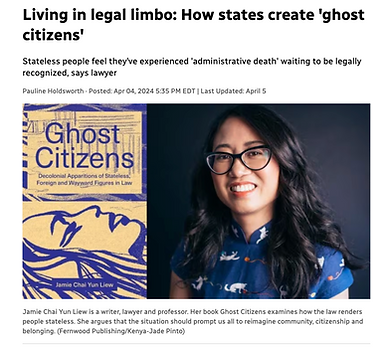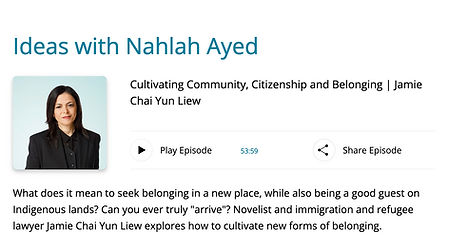Jamie Chai Yun Liew (she/her) is a lawyer, law professor, podcaster and writer.
This is how you pronounce my name.
Longlisted for Canada Reads
Jim Wong-Chu Emerging Writers Award winner: an Asian woman traces her mother's past journey in order to learn who she really is and where she belongs.
When Lily was eleven years old, her mother, Swee Hua, walked away from the family, never to be seen or heard from again. Now a new mother herself, Lily becomes obsessed with finding out what happened to Swee Hua. She recalls the spring of 1987, growing up in a small British Columbia mining town where there were only a handful of Asian families; Lily's previously stateless father wanted to blend seamlessly into Canadian life, while her mother, alienated and isolated, longed to return to Brunei. Years later, still affected by Swee Hua's disappearance, Lily's family is stubbornly silent to her questioning. But eventually, an old family friend provides a clue that sends Lily to Southeast Asia to find out the truth.
Winner of the Jim Wong-Chu Emerging Writers Award from the Asian Canadian Writers' Workshop, Dandelion is a beautifully written and affecting novel about motherhood, family secrets, migration, isolation, and mental illness. With clarity and care, it delves into the many ways we define home, identity, and above all, belonging.
Page Title
This is a Paragraph. Click on "Edit Text" or double click on the text box to start editing the content and make sure to add any relevant details or information that you want to share with your visitors.

Ghost Citizens is about in situ stateless people, persons who live in a country they consider their own but which does not recognize them as citizens.
Liew develops the concept of the “ghost citizen” to understand a global experience and a double oppression: of being invisible and feared in law. The term also refers to two troubling state practices: ghosting their own citizens and conferring ghost citizenship (casting persons as foreigners without legal proof).
Told through an examination of law, legal processes and interviews with stateless persons and their advocates, this deeply researched book examines international and domestic jurisprudence as well as administrative decision making to show an emerging practice where states are pointing to a mother figure, constructed in law as racialized, foreign and potentially disloyal, to depict persons as not kin and therefore the responsibility of other states.
By tracing British colonial legal vestiges in the case study of Malaysia, Liew shows how contemporary post-colonial, democratic and multi-juridical states deploy law and its processes and historical ideas of racial categories to create and maintain statelessness.
This book challenges established norms of state recognition and calls for a discussion of ideas borrowed from other areas of law, including Indigenous legal traditions and family law, on how we should organize our communities with more respectful relations and treatment among kin.
Migration Conversations Podcast


Find Migration Conversations wherever you listen to your podcasts.
Available on Apple, Spotify, Google and elsewhere.
Listen to my talk on with CBC Ideas called Cultivating Belonging
Listen to my conversation with Nahlah Ayed on CBC Ideas
Watch my interview on TVO The Agenda.
Watch my interview on The Social
Canadian Bar Association National Bar Magazine: A new book makes the case for renewed communities and connections






.jpg)

